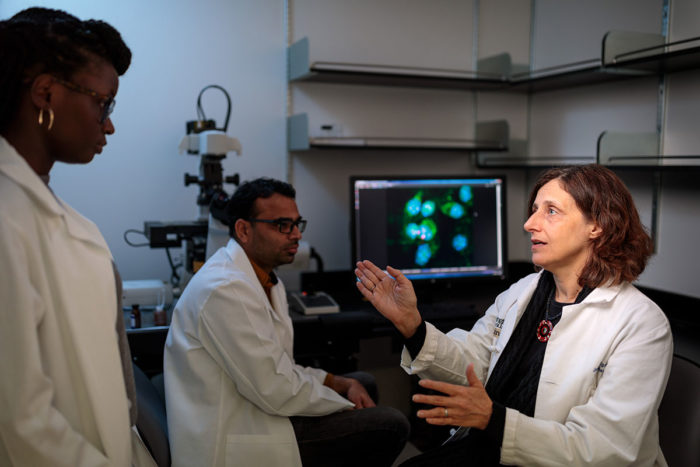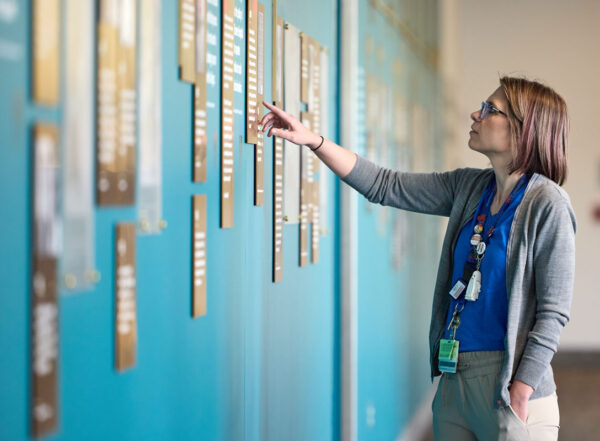Philips named co-director of infectious diseases division
Known for her work in tuberculosis
 Matt Miller
Matt MillerJennifer Philips, MD, PhD, (right) speaks with two members of her lab: postdoctoral researcher Ekansh Mittal, PhD, (seated) and technician Grace Uwase. Philips has been named co-director of the Division of Infectious Diseases in the Department of Medicine.
Tuberculosis expert Jennifer Philips, MD, PhD, an associate professor of medicine, has been named co-director of the Division of Infectious Diseases in the Department of Medicine at Washington University School of Medicine in St. Louis.
“Dr. Philips is an outstanding physician-scientist,” said Victoria J. Fraser, MD, the Adolphus Busch Professor and head of the Department of Medicine. “She is an accomplished investigator with tremendous organizational skills, a keen eye for talent and a terrific track record in mentoring trainees. I am confident of her ability to work with other departments such as molecular microbiology, pediatrics, and pathology and immunology to develop the next strategic plan for basic research in infectious diseases.”
Philips succeeds Daniel Goldberg, MD, the David M. and Paula L. Kipnis Distinguished Professor of Medicine, who is stepping down after 18 years. In her new role, she will oversee the basic-science research faculty and laboratory-based research for the division. Her co-director, William Powderly, MD, the J. William Campbell Professor of Medicine and the Larry J. Shapiro Director of the Institute of Public Health, will continue overseeing the clinical faculty, operations, clinical research and educational programs.
“Dan Goldberg leaves big shoes to fill,” Philips said. “I hope to build upon the amazing growth of the research excellence he has led. Wash U has incredible strength in immunology, microbiology and infectious disease research, and as a community, we have a unique opportunity to forge interdisciplinary collaborations, capitalize on new technologies, and make fundamental discoveries to help improve human health. I’m honored to serve alongside Bill Powderly and work with the exceptional investigators in this mission.”
Philips studies the world’s deadliest bacterium: Mycobacterium tuberculosis, the cause of tuberculosis. Her work focuses on how TB bacteria evade the body’s immune defenses and cause disease, a key step in developing better drugs and vaccines to combat the lethal infection. She holds two patents related to enhancing the ability of immune cells to fight the TB bacteria.
Philips earned her bachelor’s degree in biochemistry from Columbia University before moving to the University of California, San Francisco, where she earned her medical degree and a doctorate in biochemistry and biophysics. She completed her internal medicine residency at Brigham and Women’s Hospital in Boston and clinical infectious diseases training at Massachusetts General Hospital, and Brigham and Women’s Hospital, followed by a research fellowship at Harvard. After stints at Novartis Institutes for BioMedical Research and New York University School of Medicine, Philips joined the faculty at Washington University in 2015.








